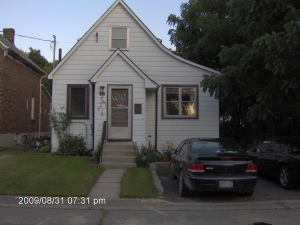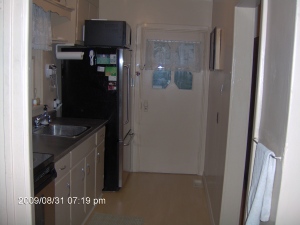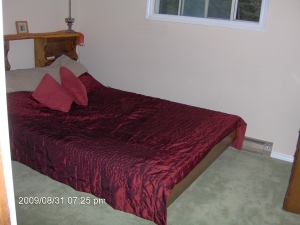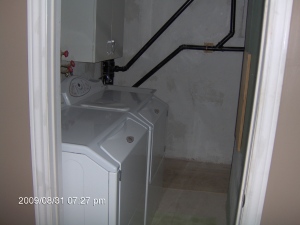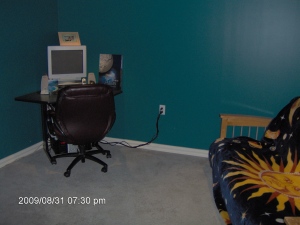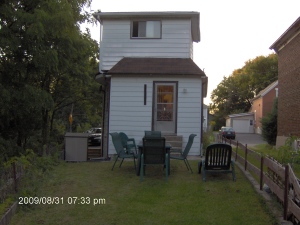Filed under: Buying, Rebecca Sargent | Tags: $160K to $175K, 11 Reinhardt Street, 2 bathroom, 2 bedroom, Buying, downtown, for sale, Kitchener
THIS HOME HAS NOW SOLD!
Are you a first time buyer looking for that perfect starter home at a great price? Look no further!
11 Reinhardt Street, Kitchener
asking $164,000
The last home on quiet street with only 5 properties, this unique starter home is right in the downtown Kitchener core. You can walk within minutes to King Street, shopping, schools, parks and many other amenities; the #18 bus comes just out the end of the street on Weber.
The home has had many upgrades including 100 AMP service, plumbing, and potential in-law suite with separate walk-out entrance in the basement.
The kitchen, in soft taupe, has beautiful laminate (faux wood) floors and all newer stainless steel appliances (electric stove and fridge).
Some original glass hardware on the door give a touch of character.
The kitchen-adjacent dining room features an original built in cabinet with frosted glass panels.
The living room features newer laminate (faux wood) floors and soft colours.
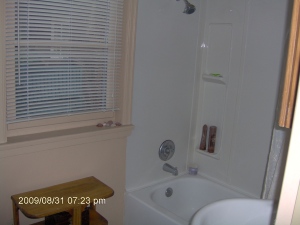
Main floor bathroom directly off the living room with full shower/tub.
Bedroom 1 upstairs
Laundry area down the stairs from the kitchen. Features front loading washer and dryer.
Downstairs rec room features double sink cabinet and walk-out entrance to the side of the home. Possibility of converting to in-law suite or bar area.
Downstairs bathroom has stall-shower and closet space.
Downstairs bedroom/office is approximately 14′ X 10′.
Why don’t you come see it for yourself?
Please call me today for an appointment at 519-591-4299.
Schools in the area:
Public Schools:
Grades JA-06 King Edward Public School; 709 King Street West; 519-578-0220
Grades 07-08 Margaret Avenue Public School; 325 Louisa Street; 519-578-1910
Grades 09-12 Kitchener-Waterloo Collegiate; 787 King Street West; 519-745-6851
Catholic Schools:
Grades JA—08 St. Teresa Grades; 270 Edwin Street; 519-743-2131
Grades 09-12 St. David Catholic Secondary School; 4 High Street; 519-885-1340
French Schools:
Grades JK-06 Mere Elisabeth Bruyere; 280 Glenridge Drive; 519-880-9859
Grades 07-12 Pere Renee De Galinee; 450 Maple Grove Road; 519-650-9444
Filed under: Buying, Market Conditions, Rebecca Sargent | Tags: Buying, Cambridge, Galt, Hespeler, housing market, Kitchener, Kitchener-Waterloo region, market condition, Preston, real estate, Waterloo
Kitchener-Waterloo has been feeling the effects of the economy. There have been layoffs, or talks of layoffs in several industries, and many people are feeling very anxious. This anxiety has impacted the real estate, housing and building industries; slowing housing starts (the construction of new buildings) to slightly lower levels and decreasing housing unit sales. Buyers are finding a wide range of units to choose from and increased bargaining ability as the market remains in their favor. Sellers are finding their home is sitting slightly longer than usual on the market before being sold. Overall, conditions are still relatively comfortable, though perhaps not entirely optimistic for the next couple of years.
There were 269 units sold in Kitchener-Waterloo region in February. The number of single family-detached homes sold in February was 27.5% lower than February of last year. The number of all residential units sold in February was down 27.2% from February of last year. Even with this lower number of sales from last year, the total number of sales was up nearly 26.7% from January 2009 and up 28% from December 2008; with the warming weather likely to only bring increasing sales. There were 53% fewer multi-family units sold in February from last year, up from January 33% and up 60% from December. Farmland and vacant land sales increased across the board.
Year to date sales are down for all units by 28.6% from 779 units sold by the end of February in 2008 to only 556 units sold so far in 2009. 91% of unit sales were in resale homes, with 9% in new home sales. The majority of these sales happened in single family detached residential units.
30% of these residential sales were priced under $200,000, and 78% of all the residential sales were priced under $300,000. There have been no sales over $750,000 so far this year. The average sale price for residential properties was $244,419, down slightly from last year’s average of $254,564.
West Kitchener had the highest volume of sales last month with 130 sales, followed by West Waterloo with 73 sales. Waterloo East had the lowest number of sales with only 41 sales. In Cambridge, properties are moving the most in Hespeler, and least in North Galt.
Now is a great time for buyers. Interest rates are relatively low and as homes stay longer on the market, more bargaining becomes possible. Property values are still likely to increase over the long term (ie. More than 5 years).
If you are a (first time) home buyer, now’s the time to talk to a mortgage broker or banker to see if you can qualify for a mortgage and to take advantage of favorable interest rates.
Once you have found the perfect property, it’s time to make an offer! This is where having a REALTOR® can really help you!
You want to be realistic in your offer; something that you can reasonably afford, and something you think that the other party will reasonably sign. So how do you come up with the price? Your REALTOR® should provide you with a some information on comparable properties to help you decide on proper pricing. Comparable properties should include a couple of active listings, recently sold listings, and expired listings from the last 6 months or less. In Ontario, your REALTOR® has access to information sheets on a property through their local real estate board online databases and the MLS systems. The information sheets usually detail the price, days on market, type of property (ie. Single family residential, duplex, condo), number of bedrooms, lot size, and other such details. Listings should have similar qualities (ie., # of bedrooms, property size, type of home); the more similar, the better the comparison.
Active listings let you know similar properties’ current asking price. Sold listings help to give you an idea of homes that were probably fairly reasonably priced and this can be a good marker to know what the actual selling price is in your area for your type of home. Expired listings tend to indicate a price that was too high for the market (or sometimes some sort of other deficiency or problem with the listing). This will make it easier for you to decide whether the sale price matches the local reality and whether you should offer more, less than or equal to the asking price.
It is advisable to include a home inspection clause in your offer. Sometimes it will be necessary to include certain other clauses to protect your interests. For example, if the property has a well, a fuel tank or a fireplace, there are certain certifications that can be obtained or requested to ensure they meet standards and are in proper working order. If you have any concerns about the property, bring them up with your REALTOR® and make sure they include the proper clause(s) to protect you.
All fixtures and chattels that are staying with the property should be clearly expressed on the offer, so that there is no confusion at closing. It is advisable to get the make and model number for each appliance (and even pictures if you can during the viewing or inspection) so that if there is any dispute over chattels and fixtures at a later date, you have substantial backing for your claims. Fixtures are attachments to the property that may be personal property. This could be things like a chandelier, or pool filtering equipment. Chattels are things that may not be specifically attached to the property but that would be considered (by some) to be part of the property. This could include such things as the stove, the refrigerator, washer and dryer, etc.
Your REALTOR® will probably use a standard Agreement of Purchase and Sale form provided by the Ontario Real Estate Association (OREA) and probably attach a Confirmation of Cooperation and Representation and a Working with a REALTOR® brochure. These contracts have pre-printed standard clauses that have been approved by OREA. It is not advisable to stoke out any of these clauses without understanding what they mean. They have been developed to protect everyone’s basic interests. Ask your REALTOR® to explain anything you don’t understand– this is why you pay them– to answer your questions and facilitate the real estate process. The Confirmation of Cooperation and Representation and Working with a REALTOR® brochure set out the relationship between you and your REALTOR®. I have included sample versions of these forms below.
Sample Confirmation of cooperation and representation
Sample working with a realtor brochure
Usually a deposit will be attached with the offer as a sign of good faith. The deposit can also be given upon acceptance of the offer (once all parties have signed and agreed to the offer).
Your REALTOR® will then present the listing agent (the seller’s agent) with the written offer, which can be either be accepted, rejected or counter-offered by the Seller. You should not sign the offer if you are not happy with the details inside because you are bound to it once it signed legally. Usually the offer is conditional upon inspection or other conditions as found in the purchase and sale agreement, and so doesn’t become what we call “firm” until a later date.
If the Seller rejects your offer, you can either come back with a better offer or move on to a different home. Offers are rejected for many reasons. If you DO make another offer keep in mind the following: the price, the closing date, the number and type of conditions, and which fixtures or chattels are included. Sometimes simple things, other than just the price are keeping the seller from accepting. If the Seller counter-offers to you; you then have the choice to accept, reject or counter-offer. This goes back and forth until a final agreement is reached or the parties decide to walk away.
There is then usually a period of time for the conditions to be waived. This would give you the time to get home inspections, or financing papers together and finalized. Once the conditions have been met, you can waive the conditions using a Waiver form.Once all conditions have been waived, the deal is considered “firm” and now set to finalize.
Any changes to the conditions, purchase price, chattels, etc. will probably be made on an Amendment form.
After this point, the offer goes to your lawyers office where they check the title and do all the closing arrangements. You will probably have to go in and sign documentation at this point with your lawyer.
Then comes the closing date and it is time for you to move!
You want to buy a great house, but what do you look for? After figuring out what you can afford, you should begin to think about what you really need and want in a new home.
Do you want to be in the heart of the city, the suburbs or in the country? What type of neighborhood are you looking for? What features do you absolutely need in a home? What features would you like to have? How many bedrooms do you need? Is a big property important to you? Think of the spaces you will need or want to live your life. Do you need spaces for entertaining? A home office? A workshop? A garage?
Decide on a top five criteria that are important to you. Remember. It might not be possible to find a home with every feature you are looking for, but this will help you focus your search so that you can find the best home for your needs.
There are many factors to consider when selecting a new neighborhood. If possible, you should first scout the area in person- You live in more than just your house!
– Talk to people who live there- go for a walk through the neighborhood, check out the local shops and services.
– Drive through the area at different times of the day, during the week, and on weekends. This will help to eliminate any suprises.
– Look carefully at how well other homes in the area are being maintained; are they painted, are the yards cared for, etc.
– Consider things like access to major highways, city centres, transit, shopping, etc.
– Listen for noise created by roads, commerce, railways, public areas, schools, etc.
– How far will you be from work? Drive or take the commute and check it out!
Once your list of needs and wants is made, it is time to begin searching for properties.
Filed under: Buying, Rebecca Sargent | Tags: advice, Buying, realtor duties
The Realtor should first discuss with you the values and services he/she will bring to the table.
What SHOULD they be doing for you as a Buyer agent?
• Organize and schedule your home search process
• Discuss with you the benefits and drawbacks of each home in relation to your specific needs
• Provide you with ongoing updates on available homes
• Help you compare homes and make a decision
• Advise you on the terms and issues of the offer and fill out the purchase order contract
• Present your offer and negotiate on your behalf
• Coordinate and supervise the preparation of all closing documents and guide you through the closing process
• Help you resolve any closing issues
• Answer all your questions in a timely manner.
Decide on the values that are important to you, and discuss them with your Realtor. Are they willing to provide you with all the services you need? Get it in writing!
You will then need to decide whether you want to sign a contract with your Realtor. There are several types of contracts, depending on the services you will require.
The Buyer Agency Agreement is the most common. This agreement:
• Establishes the type of relationship that is involved
• Sets out the duties and responsibilities of both parties
• Details commission arrangements and buyer responsibilities if commission is not to be paid by the seller
Why should you sign an agreement?
By signing the Buyer Agency Agreement, you ensure that your Realtor is working for you in a client relationship, meaning that the Realtor must represent you exclusively in the contract. It lets the Realtor tell you all the information they know about the property, and makes sure they are obligated to work in your best interest.
The traditional agency relationship requires that all agents have a fiduciary relationship with the seller. That means that it’s their job to protect the interests of the seller. By entering into a Buyer Agency Agreement, you ensure that the Realtor will always be protecting your interests.
The agreement also protects your Realtor. It means that you acknowledge that he/she is representing you for the duration of the contract period, and that you are agreeing to work exclusively with that Realtor for the duration. This means you have the responsibility to notify the Realtor of any property that you are interested in during this time period and your Realtor will make all the arrangements to view the home. This includes homes that come directly from the builder, or open houses that you want to inspect in the neighbourhood.
Deciding whether or not to sign a Buyer Agency Agreement is up to you. You can sign the Agreement for one property, or one area, or for everything you are searching for. You should discuss the terms of service that the Realtor will offer you in return for your signing and get all the details in writing. This could include certain marketing aspects and all the rights and duties that each party will perform. This is a promise for a promise: you promise your Realtor exclusivity, and they promise you service. This means that if your Realtor does not perform the set services, you CAN fire them. But be aware that Buyer Agency contracts typically have what is called a “hold over” period (usually 30-60 days). If you purchase a property that was introduced to you by your Realtor within this period, they are entitled to commision under most contracts.
Things you can do to protect yourself:
– ask for a short term or specific contract (for 30 days, or 24 hours, or for a specific property, area or price range);
– ask about anything on the contract you don’t understand- if the Realtor cannot explain it to you in clear terms- do not sign it.
– Get copies of anything you sign, and keep it in a file for yourself
– Know what duties to expect of your Realtor, and make sure they answer all your questions. Remember there is no such thing as a “dumb” question- so ask if you don’t understand! It is part of your Realtor’s job to answer your questions.
Filed under: Buying, Rebecca Sargent | Tags: afford, Buying, mortgage, price
Would you like to buy a home, but don’t know whether you can afford it or not?
Here’s what you can do:
– Check your credit score. You can do this online at http://www.equifax.ca for about $25.
You are probably looking for a score of at least 600 to be able to qualify for a mortgage. There are many ways you can begin to improve this score. Make sure to make at least your minimum payments on your credit cards each month, and pay all of your bills on time. If you have a large amount of debt, talk to a debt counselor or banker to find out what can be done to up your score. Try Debt Freedom Canada at (519) 342-2524 (located in behind Century 21’s current location at 1770 King Street, Kitchener).
– If your credit score looks good, and you are steadily employed (typically for at least 2 years): you should consider talking to a mortgage broker about your ability to qualify for a mortgage. Mortgage brokers will look at your employment status and history. This involves looking at your gross monthly income and the length of your employment (usually 2 years of steady work). They also look at your credit history (any debts you have, debt balances versus your credit limits, how you handled debt in the past, missed payments, late payments, etc.), your assets (stocks, bonds, personal property), and the value of the property you want to purchase. Mortgage brokers are sometimes able to help you build a down payment through special programs. Try Discount Mortgage Canada (who shares an office with Century 21) at 1-866-833-8601 or 519-570-9684 to find out whether you are able to qualify for a mortgage.
– Can’t make a down payment? The Region of Waterloo (which includes Waterloo, Kitchener, and Cambridge) runs an Affordable Home Ownership Program. This program allows first time home buyers to obtain a down payment loan of up to $10,000 (payable when you sell your home). This applies for homes under $226,000, for those with household incomes of less than $68,000. Check out the full details at http://www.region.waterloo.on.ca/aho.
– Mortgage payments can be similar in amount to your current rental payments. The only difference is that instead of losing the money you pay into your residence to a third party, mortgage payments go towards increasing YOUR equity. If you can qualify for and afford a mortgage, home ownership makes a lot of financial sense.
Things to consider:
– Closing costs typically range between 2-5% of your mortgage loan and include things such as land transfer, title policies or insurance, recording fees, inspections, attorney’s fees and lenders fees. This works out to approximately $3,500 to close for a $250,000 home purchase.
– Closing (the day you gain possession of your new home) typically takes place between 30-120 days after signing the agreement.
– A deposit is usually required at the acceptance of the agreement of purchase (at the time your offer is accepted by the Seller). Deposits usually start at around $1,000.
– Lenders require that monthly payment ranges for your mortgage be between 25-8% of your gross monthly income. This would include the principal on your loan (P), the interest on your loan (I), property taxes (T), and homeowner’s insurance (I). You monthly PITI payments (as these are called) plus all of your debt payments should range between 33-38% of your gross monthly income.
If you have any questions, please feel free to contact me at rebecca.sargent@century21.ca!



